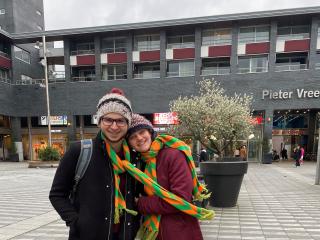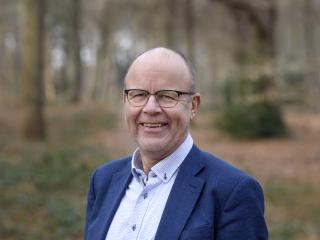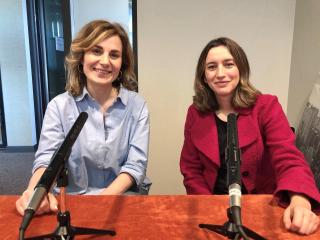Connecting science and practice of entrepreneurship
Josette Dijkhuizen is an entrepreneur and endowed professor of ‘Sustainable employability of entrepreneurs in the Netherlands’. She is determined to put the theme of personal development for entrepreneurs on the map. But she has many other goals and ambitions too. In this interview, Josette talks about what drives her.
You have been endowed professor of 'Sustainable employability of entrepreneurs in the Netherlands' at Tilburg University since May last year. Why does this area interest you so much?
“I’ve been an entrepreneur myself for almost twenty years. I started out as a coach for other entrepreneurs, first working with startups and later for more established entrepreneurs too. Back then I noticed that there was so much focus on things like business models and corporate growth, but we would often forget about the most important thing: the entrepreneurs themselves. In 2011, I published a book called Het ondernemersgen (The Entrepreneurial Gene). It’s about how you can grow and develop as an entrepreneur, among other things. In retrospect, that book came much too early. People weren’t ready for it. ‘What’s all this about personal development? We just need customers, don't we?' And yes, having customers is very important of course, but acquiring them takes personal qualities and skills.
Sustainable employability is about staying employable right up until the end of your working life. That generally means focusing on the workers themselves. We sometimes forget that entrepreneurs are workers too. A lot can change over the course of a person’s working life. People get older and maybe they have children. For entrepreneurs, there’s also a business that’s centered in the world at large and that never stops changing and evolving. As an entrepreneur, you always have to make sure that your business has stability and continuity, but you also need to check that you still have a good match with your company. So it’s not only about what is going on around you and what that means for your business, but also about how you stay vital and how to retain your core qualities so that you can still be running your business in three years time.”

As I always say: your company’s strength comes from the strength that’s inside you
Endowed professor Josette Dijkhuizen
Are people more aware of that today?
“Not much. But I’m doing my best to raise awareness. When I ask entrepreneurs about sustainable employability, they answer that their business is sustainable because they are saving energy or employing people who would otherwise find it difficult to take part in the labor market. Their first response is to look at their business, not at themselves. It really will be years before personal development for entrepreneurs is on the agenda. That’s a pity, because we see so many entrepreneurs dropping out as a result.
I have a new scan method coming out soon. I’ve spent years working on it. It helps entrepreneurs to engage in self-reflection. The good news is that entrepreneurs are eager to learn and try out new things. The bad news is that they don’t usually take the time to do it. Everything has to happen in a hurry. And although they’re willing to invest, they’re much more likely to invest in a new website or a different car than in themselves. They don’t see that if they work on their own personal development, their business will grow and develop with them. As I always say: your company’s strength comes from the strength that’s inside you.”
Let’s take a look back at your career. Did you always know that you wanted to be an entrepreneur?
“No, I didn’t. I grew up in a family with five brothers. They all got jobs as builders – working with timber and cement. There was nobody around me who studied at university or became an entrepreneur. But despite that, I chose to go to university. Then I had several different jobs, most of which I didn't actually enjoy. I worked for six different employers in the space of nine years. And then it clicked: it’s not them, it’s me. I noticed that I wanted to work independently, communicate my vision and organize my own time. I’ve always been an independent thinker and a doer. If I feel like writing a book and I see an opportunity, I want to be free to do it. Time is the only thing we get in life. I want to make good use of my time, and that means doing things that I enjoy. So I quit my job and set off to travel the world. Once I was back in the Netherlands I launched my own company in 2005. I was never afraid that it wouldn't work out. Being an entrepreneur always involves uncertainty and risk. That goes with the territory. In addition to my paid work, I also like to think about people who are less fortunate than me. For example, I sell products made by women refugees in markets so that I can tell their story. I think it's wonderful what they manage to achieve in the most difficult circumstances. I can tell the stories of Zainab and Saba and other refugee women a hundred times with the same enthusiasm. And I hope that everyone hears those stories. I’m at the FeelGood Market in Eindhoven every month, selling their products. Now I’m setting up a shop to sell them too, and also to provide people with information about refugees and migrants. I need some money for that venture, so I’m trying to minimize the risks and put money aside. That’s a choice too. We all choose our own path.”
Now I have various labels that are all about the development of entrepreneurship
In 2015 you were awarded a PhD from the Tilburg School of Social and Behavioral Sciences. Why did you go for a PhD?
“My career has changed a lot over the years. I started out as a coach, but I noticed that the work didn't suit me very well. In the meantime I started giving presentations and writing books, and I introduced some new concepts to the market. Now I have various labels that are all about the development of entrepreneurship.
For one of my books I read so much scientific research that people started asking me why I didn’t do a PhD. And when something feels right, I just do it. I had no idea what a PhD involves, but I always wanted to connect science with practice. I try to lay a foundation in everything I do. My PhD was on stress and well-being among entrepreneurs in the Netherlands. I found it quite tough, but it did give me a direction. It was part of my personal development, and it helped me to find a unique place in the job market.”
Did you become an endowed professor partly with that in mind?
“My career has changed a lot over the years. I started out as a coach, but I noticed that the work didn't suit me very well. In the meantime I started giving presentations and writing books, and I introduced some new concepts to the market. Now I have various labels that are all about the development of entrepreneurship.
For one of my books I read so much scientific research that people started asking me why I didn’t do a PhD. And when something feels right, I just do it. I had no idea what a PhD involves, but I always wanted to connect science with practice. I try to lay a foundation in everything I do. My PhD was on stress and well-being among entrepreneurs in the Netherlands. I found it quite tough, but it did give me a direction. It was part of my personal development, and it helped me to find a unique place in the job market.”
You run a company that provides several different services, you do volunteer work, you travel all over the world and you are an endowed professor one day a week. You have a lot on your plate. How does that affect your own sustainable employability?
“It’s all about making choices. Every week I get requests from externals – from students asking me for advice or to give a presentation, for example. I wish I could accept them all, but unfortunately I can't. My brain is constantly switched on. I have good people around me who I can exchange thoughts with and I keep an eye on myself. If I’m not sleeping well and I get a headache, it’s time to switch off. Fortunately, I get a lot of satisfaction from my work – otherwise I’d be doing something different. But there are certain things that you have to do. I’m single, so I have to earn my own living.”
It's about combining doing new things with making a difference
What do you derive more satisfaction from – supporting Dutch entrepreneurs or your work for Women4Women, in which you facilitate coaching for female entrepreneurs in the Middle East and North Africa?
“They are both about the development of entrepreneurs. For my organization Ondernemerschap in bedrijf, for example, we organize strategic sessions and workshops at companies. I really enjoy those. But if I have to do the same workshop three times for the same company, I prefer to pass it on to my colleague. I get my energy from doing new things. And I love travelling. Recently I was in Iraq to give a training course for a university. It was my first time there and it was quite a challenge to get it off the ground. I arranged a busy program and I held the training in one place over three days. That’s the way I like to work. But if you asked me to do the same training session again in the same place... No, I’d rather do something new.
It's about combining doing new things with making a difference. For example, I really want to start projects for female entrepreneurs in Libya. Brave? It might seem that way, but I met a fantastic lady in Libya and we’re working on a great and very valuable project together, setting up an 'incubator' for female entrepreneurs. I'm doing everything I can to help her and to get the project off the ground. It’s not easy, but I believe in it and I’m confident that we can really make a big difference for the women there.”
What are you most proud of?
“It wasn't until I was inaugurated as an endowed professor that I realized that I’d managed to do it all: I was an entrepreneur, I’d published various books, I was giving training courses all over the world, I had been the Dutch UN Women's Representative and now I was a professor. But the thing I’m most proud of is that I did all of that on my own. I haven’t had any ‘friends in high places’ to help me, and I’ve run into countless obstacles along the way. Sometimes I think to myself – couldn't I have it easy for once, with things just falling into my lap? When I stood on that stage to give my inaugural speech on October 14, I thought – this is it, you’ve made it. But actually I’m not there yet. There’s still a lot of work to be done.”
Date of publication: 24 April 2023



